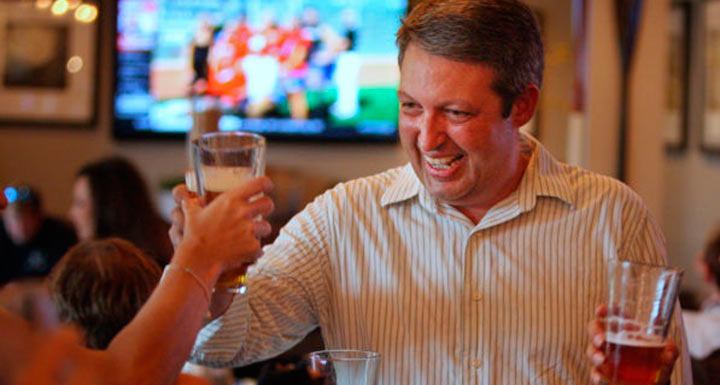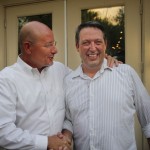
Meet Adrian Wyllie, the outlaw Libertarian in Florida governor’s race
The Libertarian Party candidate for governor, Wyllie is running in a year when polls show voters are starved for an alternative to Republican Gov. Rick Scott and Charlie Crist, the likely Democratic nominee.
At first glance, people at the Sea Dog Brewing Company appeared taken aback that a guy in jeans and a rumpled shirt with a glass of craft beer in his hand could be a serious candidate for governor, and even people who like his message say victory is highly improbable.
“It’s refreshing to hear that there’s an option out there,” said Alan Wegner, 56, a building engineer and registered independent. “Between you and me, he probably won’t win. I’m hoping he does, but maybe he’ll make a dent.”
Most voters have no idea who Wyllie is, and third-party candidates have a dismal track record in statewide elections in Florida. But polls suggest his chances are better because voters are disillusioned with the front-runners, and he could earn a spot in upcoming statewide TV debates, which would spread his anti-government message to the masses for the first time.
“Something is changing,” Wyllie, 44, told the crowd. “We’re still an underdog, but we have a legitimate shot to win this election.”
In a statewide poll of 1,251 voters by Quinnipiac University last month, Wyllie won support from 9 percent of voters, with Crist getting 39 percent and Scott 37 percent. About half of all voters said they considered neither Crist nor Scott honest and trustworthy. The poll said 92 percent of voters had not heard of Wyllie.
A Palm Harbor resident, Wyllie rejects the notion that he’s just a spoiler, none-of-the-above candidate.
“If you actually want to change government, people have to change the way they vote,” he said. “No vote of conscience is a wasted vote, ever.”
Wyllie (pronounced WY-lee) wants change, all right. He opposes all property taxes for homeowners, in-state tuition for undocumented immigrants, red-light cameras, the federal health care law and random drug tests.
Adding to his image as a political outlaw, he risks being arrested for his views.
When Wyllie’s driver’s license expired three years ago, he refused to renew it and has driven illegally since. It is his way of protesting Florida’s participation in the federal REAL ID act, a post-9/11 law requiring motorists to produce extensive proof of identification that Wyllie says is too intrusive.
Wyllie is a third-generation Pinellas County resident, a 1988 graduate of Dunedin High and self-employed IT consultant for car dealers who earned $48,000 last year. Once a Republican, he became a Libertarian in 1996, and he and his wife, Dawn, have two sons.
Court records show Wyllie was sued in small claims court by American Express Corp. and by the landlord of his IT business, but he says both cases are resolved. He said he paid $318 in fines and costs for a traffic violation that resulted in a court judgment that records show was still outstanding on July 18.
SunTrust Bank began foreclosure proceedings on Wyllie’s Palm Harbor home in 2010. Court records show the case is still open, but Wyllie and his wife live there and he says the case is resolved.
“I’m a middle-class guy. I face the same problems that Floridians are facing,” Wyllie said. “I’m not living in an ivory castle like Rick Scott and Charlie Crist.”
Operating a shoestring campaign of about $50,000 in contributions so far, Wyllie is in the midst of a monthlong statewide campaign tour of craft breweries.
“I’m the third guy,” Wyllie said, working tables at Sea Dog on Thursday. “I’m fiscally conservative and socially tolerant.”
“I love him,” said Chris Pack, 35, a Clearwater graphic designer who chatted with Wyllie over their shared interests in playing guitar. “I think he has a better chance than, how should I say it, other oddball or third-party candidates.”
Wyllie hopes to attract votes from both sides of the spectrum, from liberals who like personal freedom and conservatives who favor less government. He would free in-state businesses from all federal regulations, including occupational safety rules and the Americans With Disabilities Act.
His timing may be good for another reason: Wyllie is running as a champion of personal freedom in the same election when Florida voters will decide whether to legalize medical use of marijuana, a November question that has the potential to attract single-issue voters tired of traditional two-party politics.
Wyllie said he voted for Scott in 2010, a decision he says he “sincerely regrets” because state spending has grown so much in the past four years. In May, Scott signed a $77 billion budget, the largest in state history.
If elected, Wyllie says he’ll push for a 100 percent homestead exemption, which means most homeowners would pay no property taxes.
He would cut the state budget by 30 percent — public schools included — and says there is that much waste in government. He then would divert one-third of state sales tax revenues to cities and counties to make up for the lost property taxes.
“One of the big disconnects with people is that spending equals quality,” Wyllie said. “It doesn’t.”
Conservative Republicans are shocked by Wyllie’s notion of cutting state spending by 30 percent. That much waste simply does not exist, says Senate Appropriations Chairman Joe Negron, R-Stuart, who directed a Senate review of all spending during the past year.
“The idea that we can slash one-third of the state budget is fanciful and would decimate public schools,” Negron said. “It’s really a frivolous idea that we could eliminate property taxes.”
Wyllie’s running mate for lieutenant governor is Greg Roe, an insurance agent from New Port Richey who shares Wyllie’s dislike for property taxes. Roe’s wife, Julann, paid the couple’s $11,000 Pasco County property tax bill last November in a duffel bag filled with $1 bills.
“How do you like Rick Scott and Charlie Crist?” Wyllie said as he greeted a 20-something woman at Sea Dog. As she frowned, he said: “I love asking that question.”






